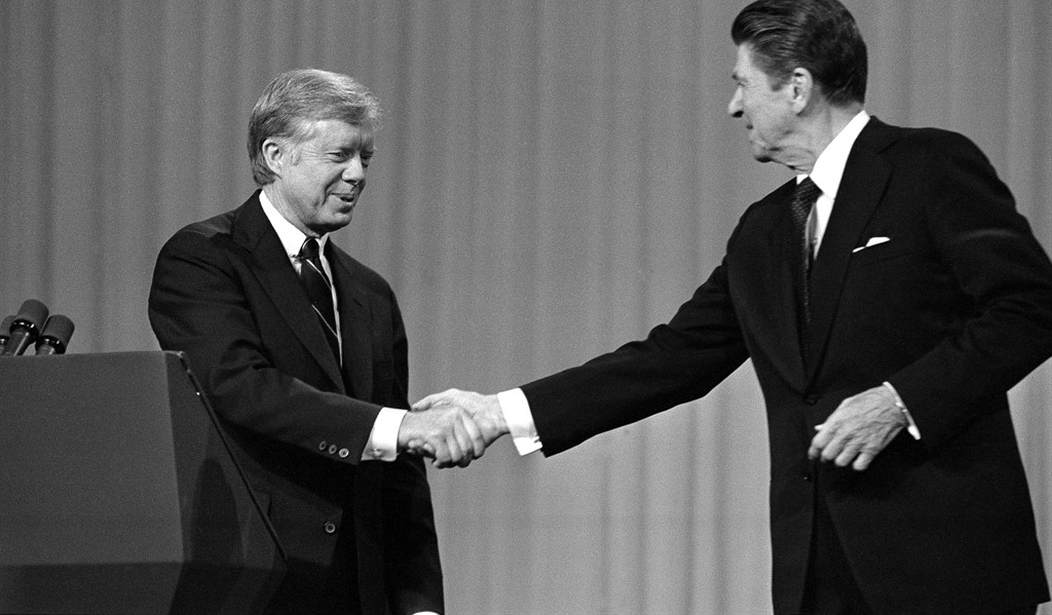When a historical figure passes away, it’s almost inevitable that there will be a concerted effort to paint him in a favorable light — after all, the old adage of “don’t speak ill of the dead” prevails. However, the attempt to rewrite Jimmy Carter’s legacy following his death has reached such absurd, almost Orwellian heights, as if others are trying to erase history and pretend that Carter wasn’t one of America’s most ineffective presidents.
Like clockwork, media outlets have rushed to elevate his presidency, attempting to reframe his time in office as the golden age of moral leadership. The most egregious example of this revisionism comes from Washington Monthly, which published a piece under the headline “The Surprising Greatness of Jimmy Carter.”
This misguided attempt to elevate Carter goes beyond historical distortion — it risks rewriting history in a way that undermines the true facts of the 20th century. The article features a simian depiction of Reagan next to a towering image of Carter, who arrogantly rests his elbow on Reagan’s head.
Washington Monthly. pic.twitter.com/lhG0VVQrp8
— Tom Bevan (@TomBevanRCP) December 30, 2024
This kind of visual assault on Reagan’s legacy is not only juvenile but also counterproductive to any serious discussion about Carter’s place in history. It’s like claiming that Barack Obama was scandal-free or that Joe Biden was a healthy, vigorous president who ran circles around his staff.
But check out this doozy of a claim from the article:
But that negative assessment is beginning to change. Recently, Washington Monthly contributing editor Timothy Noah hosted a conversation between Jonathan Alter and Kai Bird, two journalists who just published major biographies of America’s 39th president. Each approached Carter from a different angle, but both arrived at a similar conclusion: Jimmy Carter is seriously underrated.
Alter and Bird both dispute that Carter was weak or lost in the weeds, as he has so often been portrayed. Carter brought more positive change to the Middle East than any president in the decades before or since; signed more legislation than any post–World War II president except LBJ; and warned of the dangers of climate change before the threat even had a name. Carter’s human rights policy played a huge and largely uncredited role in the collapse of the Soviet Union—more so, perhaps, than any policies enacted by his successor Ronald Reagan.
Claims like this are a disservice to those who remember the Cold War and the role of Reagan’s peace-through-strength strategy in securing victory over the Soviet Union.
For our VIPs: Who Was a Worse President, Biden or Obama?
The notion that Carter’s feckless human rights rhetoric played a larger role in the downfall of the Soviet regime than Reagan’s peace-through-strength strategy is not just historically inaccurate; it is outright absurd. It was Reagan’s military buildup and his commitment to confronting the Soviet threat that ultimately weakened the USSR to the point of collapse, not Carter’s insistence on moral posturing.
When one examines Carter’s legacy, it becomes clear that his presidency was marked by a series of misguided and naïve policies. His approach to the Middle East, far from promoting peace, sowed the seeds for the Islamist extremism that continues to threaten global security.
Just as Richard Nixon is forever associated with the Watergate scandal, Jimmy Carter’s most enduring legacy is his failed economic agenda, which included misguided wage-and-price controls and his mishandling of inflation — factors that directly contributed to the economic malaise of the late 1970s.
His regulatory policies stifled growth, and his failure to effectively address the energy crisis left the nation vulnerable. Carter’s misguided policies had disastrous consequences both at home and abroad, a reality that ultimately paved the way for Ronald Reagan to defeat him in a decisive landslide in 1980.
The efforts to rehabilitate Carter’s legacy are not only misguided but unjustified. They attempt to elevate a president who, in reality, was defined by his naïveté and destructive policies. The revisionist attempts to paint Carter as a president of greatness insult the memory of those who lived through the tumult of the late 20th century and a shameful display of activist journalism.










Join the conversation as a VIP Member